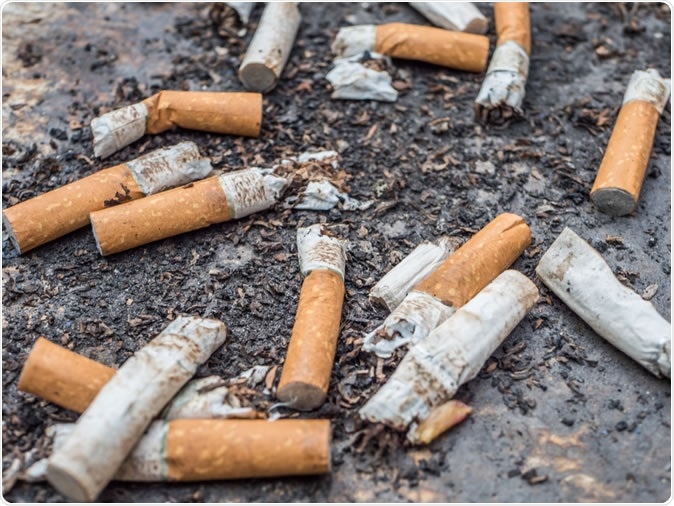Huge quantities of plastic waste are littering the planet today, stimulating both governments and the public to react in their own ways to quell the threat to global life systems. From 2021, disposable plastic food serving items will no longer be allowed in the EU. However, what about the thousands of millions of filter cigarette butts that are thrown away every single day? This is the source of the plastic item most commonly retrieved from plastic litter worldwide. Now, say public health experts, in an editorial in the BMJ, it is high time the filter cigarette was banned worldwide.

Filters are ineffective and are a leading source of plastic pollution worldwide. Credit: Animaflora PicsStock / Shutterstock
The cigarette filter
The plastic cigarette filter is manufactured using cellulose acetate, and forms the major part of the butt. They are supposed to make smoking safer by absorbing part of the tar, which is a potent factor in the causation of lung cancer in smokers. The first time these devices were marketed by the tobacco industry was way back in the 1950s – which means these plastic bits have been adding to the world’s plastic waste heap for over 60 years!
Despite the vast body of evidence that a filter in a cigarette does nothing of the sort when smoked by a human being – for instance, 400 000 deaths occur each year in the US due to smoking, almost always due to smoking filter cigarettes – filtered cigarettes continue to be sold. The filter turns dark when the cigarette is smoked, giving the impression that it is collecting toxic compounds and thus preventing the lungs of the smoker from coming into contact with these harmful substances. The truth is much simpler – the tip turns dark because of the change in the acidity of the filter when exposed to cigarette smoke.
“We now know that this safety argument was a myth, one of many created by the tobacco industry to sell cigarettes,“ say the researchers.
The filter tip also saves the industry millions of tons of tobacco, by occupying most of the space in the cigarette butt.
In short, the filter tip is a marketing tool aimed at reducing the association of smoking with toxins, and especially at attracting younger smokers. Despite this, no anti-plastic campaign has ever been directed against the filter cigarette industry for using such large quantities of an essentially unnecessary piece of plastic. Moreover, public sentiment against smoking has hardly ever recognized the corresponding evil of the plastic waste associated with it – despite the fact that cellulose acetate is a non-biodegradable plastic.
The reason behind this is largely a matter of clever marketing, according to the authors of this editorial in the BMJ. Credit must be given to the brains that have worked very hard to project only ‘good’ facts about the tobacco industry, diverting public attention from this very obvious source of plastic pollution globally.
Time for a ban
These experts behind the current opinion piece also question the exclusion of the filter tip from the EU ban on disposable plastic products. They also underline the need for a ban on this product to ensure that the commitment of EU nations to the directive of “health in all policies”, as well as to the Framework Convention on Tobacco Control. The latter convention is unique in its position as the first ever international treaty on health.
Tobacco and anti-smoking efforts
Tobacco smoking and non-smoking tobacco use remains one of the top killers as well as a cause of untold suffering worldwide. The problem with tobacco is that it appeals to the user at multiple levels, from the physical to the emotional and social cravings that often underlie the adoption of smoking. This threat can be subdued only by strong and novel plans on a national level.
The feasibility of such bold action has been demonstrated by the enforcement of no-smoking areas as well as smoke-free bars, pubs and aircraft. Several countries have successfully banned smoking in public spaces. The legally enforceable plain packaging of cigarettes with graphic warnings of danger on them has become a reality in many places.
The authors say, “It may be time for a similar radical approach that strengthens ties between the environment and health communities for the common planetary good. If we fail to reduce the trillions of butts added to the world’s waste burden annually, we undermine our efforts to curb global plastic waste and miss an opportunity to help end the global tobacco epidemic.”
Journal reference:
van Schalkwyk May C I, Novotny Thomas E, McKee Martin. No more butts BMJ 2019; 367 :l5890, https://www.bmj.com/content/367/bmj.l5890